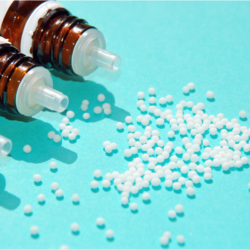Hyperuricaemia, a condition that can occur at any age, can be very uncomfortable for sufferers. However, with the right homeopathic remedies, it is possible to treat the condition and relieve the associated pain. Discover the recommended treatments for hyperuricaemia.
Hyperuricaemia is a common condition resulting from high levels of uric acid in the blood. Uric acid build-up can occur for a variety of reasons, including excessive consumption of red meat, alcohol, soft drinks and foods rich in fructose. High levels of uric acid in the blood can cause joint pain, inflammation and gout. Fortunately, homeopathy offers a natural alternative for treating hyperuricaemia. In this article, we will discuss homeopathic remedies for hyperuricaemia and their benefits.
What is hyperuricemia?
High levels of uric acid in the blood cause hyperuricemia, a condition that can occur.Uric acid is a metabolic waste product formed when purines break down. Certain foods, such as red meat, seafood and vegetables, contain purines. Uric acid is normally eliminated from the body by the kidneys, but if there is too much uric acid in the blood, it can accumulate in joints, tissues and organs, causing inflammation and pain.
Symptoms of hyperuricaemia
The symptoms of hyperuricaemia can vary from person to person. Some have no symptoms at all, while others may experience joint pain, inflammation, gout and kidney stones.
Gout is one of the common manifestations of hyperuricaemia. It is one of the primary and best-known causes of the disease. The disease needs to be treated to avoid possible complications, even if there are no symptoms for several years. The first signs may be a swelling accompanied by stabbing pain and redness in the big toe joint. Gout attacks tend to recur at the same time each year.
What causes hyperuricaemia?
Hyperuricaemia, a condition marked by an excessive concentration of uric acid in the blood, can be attributed to a variety of factors. Understanding these causes is crucial to adopting appropriate preventive and therapeutic measures.
- Purine-rich diet: One of the main culprits is diet. Foods rich in purines, such as red meat, certain seafood and offal, contribute to an increase in uric acid levels. When these purines are metabolised, they turn into uric acid. Excessive consumption of these foods can therefore have a direct impact on uric acid levels in the blood.
- Kidney problems: The kidneys play a crucial role in eliminating uric acid. Kidney problems, such as kidney failure, can reduce the body’s ability to filter and eliminate uric acid, causing it to build up.
- Body weight and lifestyle: Being overweight or obese can also contribute to hyperuricaemia. A high body mass can increase uric acid production and reduce its elimination by the kidneys. In addition, a sedentary lifestyle can aggravate this condition.
- Genetics: Genetic factors should not be overlooked. In some families, a genetic predisposition may increase the risk of hyperuricaemia. This suggests that, in some individuals, hyperuricaemia may be less related to lifestyle and more to hereditary factors.
- Alcohol consumption: Excessive alcohol consumption is another factor. Alcohol, particularly beer, contains significant amounts of purines. In addition, alcohol can reduce the efficiency of the kidneys in eliminating uric acid.
- Medication: Certain medications can increase uric acid levels. For example, diuretics used to treat high blood pressure can reduce renal excretion of uric acid, thus contributing to hyperuricemia.
- Other medical conditions: Conditions such as psoriasis, hypothyroidism or certain rare diseases may also be associated with high uric acid levels.
How can homeopathy help treat hyperuricemia?
Homeopathy can help treat hyperuricaemia by using natural remedies that work in harmony with the body. Online homeopathic remedies are prepared from natural substances that are diluted several times to reach therapeutic levels. These remedies help stimulate the body’s natural healing processes to treat the symptoms of hyperuricaemia and the anxiety that accompanies them.
Recommended homeopathic treatments
In the event of a classic gout attack, Urtica 5 CH, Apis mellifica 7 CH, Ledum Palustre 4 CH, Belladonna 7 CH and Colchicum 5 CH are recommended to relieve the pain. If the patient suffers from tendonitis, it is advisable to combine this treatment with 3 granules of Guaïacum or Benzoïcum acidum. If hyperuricaemia is due to overeating, take Sulfur 5 CH twice a day.
For women suffering from this condition, Sepia 5 CH is the remedy of choice. Lycopodium 5 CH is also effective in treating hyperuricaemia. To be effective, this remedy should be combined with Colchicum 15 CH, to prevent recurrences. In the case of chronic gout, i.e. almost permanent hyperuricaemia, it is necessary to take three granules ofArnica 5 CH in the morning, 3 granules of Ranunculus 5 CH at midday and 3 granules of Colchicum 5 CH in the evening. A dose of Nux vomica 9 CH can be taken every Sunday evening in association with the treatment for optimal recovery.
Homeopathic remedies for hyperuricaemia
Benzoicum acidum
Benzoicum acidum is a useful homeopathic remedy for hyperuricaemia with joint pain, gout and a burning sensation in the joints. Symptoms worsen at night and in cold, damp weather.
Berberis vulgaris
Berberis vulgaris is a useful homeopathic remedy for hyperuricaemia with stabbing pain in the kidneys. Symptoms worsen when the person is immobile and improve when moving.
Colchicum
Colchicum is a useful homeopathic remedy for hyperuricaemia.
Ledum palustre
Ledum palustre is a useful homeopathic remedy for hyperuricaemia with pain and inflammation in the joints, particularly the feet. Symptoms worsen at night and in hot weather.
Lycopodium
Lycopodium is an online homeopathic remedy useful for hyperuricaemia with pain and inflammation in the joints, particularly in the knees. Symptoms worsen after eating and improve with exercise.
Nux vomica
Nux vomica is a useful homeopathic remedy forhyperuricaemia with joint pain, gout and slow digestion. Symptoms worsen after eating fatty foods and improve with exercise.
The benefits of homeopathy for hyperuricaemia
Homeopathy offers many advantages for treating hyperuricaemia, including:
- Natural remedies with no harmful side effects
- Remedies tailored to individual needs
- Remedies that stimulate the body’s natural healing processes
- Remedies that can be used in addition to conventional treatments
Homeopathic remedies are becoming increasingly popular in the treatment of hyperuricaemia, as they relieve the pain associated with the condition without causing any side effects. They are also highly effective in reducing the concentration of uric acid in the blood.
Homeopathy is an alternative medicine that uses infinitesimal doses of natural substances to treat illnesses. Homeopathic remedies are non-toxic and do not cause undesirable side effects. Homeopathic remedies can be given as granules or tablets, and are easy to take.
Advice on preventing hyperuricemia
In addition to homeopathic remedies, there are several measures you can take to prevent hyperuricaemia:
- Reduce your intake of purine-rich foods, such as red meat, seafood and vegetables
- Avoid alcoholic drinks and sugary soft drinks
- Drink plenty of water to eliminate waste from the body
- Maintain a healthy weight
- Exercise regularly
What diet should I adopt in the event of hyperuricaemia?
Diet plays a crucial role in managing hyperuricaemia. Understanding the impact of certain foods on uric acid levels in the body is essential to taking effective action.
1. Avoid purine-rich foods: The purines present in certain foods are metabolised into uric acid. It is therefore advisable to avoid or limit consumption of red meat, seafood, offal and certain legumes. These foods can significantly increase uric acid levels, exacerbating the symptoms of hyperuricaemia.
2. Eat a balanced diet: Conversely, a diet rich in fruit, vegetables and wholegrain cereals can help control uric acid levels. Fruit and vegetables, particularly those rich in vitamin C, can reduce uric acid levels. What’s more, unlike refined products, wholegrain cereals do not increase the risk of hyperuricaemia. These foods also provide fibre, which helps to regulate the elimination of waste products, including uric acid.
3. The importance of hydration: Drinking enough water is essential. Water helps dilute uric acid and encourages its elimination by the kidneys. It is generally recommended to drink at least 2 litres of water a day, although this requirement may vary depending on the individual and their level of activity.
4. Reduce sugar consumption: Sugary drinks, particularly those containing fructose, can increase the risk of hyperuricaemia. Fructose promotes the production of uric acid. It is therefore advisable to limit consumption of soft drinks, sweetened juices and other drinks rich in fructose.
5. Moderate alcohol consumption: Alcohol, especially beer, can increase uric acid levels. Moderate or limited alcohol consumption is therefore recommended for people suffering from hyperuricaemia.
In short, a well thought-out dietary approach is essential in managing hyperuricaemia. Avoiding purine-rich foods, favouring a diet rich in fruit, vegetables and wholegrain cereals, keeping properly hydrated, and moderating sugar and alcohol consumption are key dietary strategies for maintaining healthy uric acid levels.
Conclusion
Homeopathy offers a natural alternative for treating hyperuricaemia and its symptoms. Homeopathic remedies are prepared from natural substances that are diluted several times to therapeutic levels. These remedies help stimulate the body’s natural healing processes to treat the symptoms of hyperuricaemia. In addition, there are several preventative measures you can take to reduce your risk of hyperuricemia.
FAQ
- Do homeopathic remedies for hyperuricaemia have side effects? Homeopathic remedies are prepared from diluted natural substances, so they have no harmful side effects.
- Can homeopathic remedies be used in addition to conventional treatments? Conventional treatments can be supplemented by the use of homeopathic remedies to treat hyperuricaemia.
- How long does it take for homeopathic remedies for hyperuricaemia to work? The time needed for homeopathic remediesfor hyperuricaemia to work can vary from person to person.It is important to follow the homeopathic practitioner’s instructions for the best results.
- Can homeopathic remedies cure hyperuricaemia? Although homeopathic remedies can help treat the symptoms of hyperuricaemia, a healthcare professional should be consulted for appropriate treatment.
- How can I find a homeopathic practitioner to treat my hyperuricemia? You can find a homeopathic practitioner by searching online or by asking your GP or friends and family for recommendations.
Ultimately, homeopathy offers a natural option to help treat hyperuricemia and its symptoms. By using homeopathic remedies tailored to individual needs, you can stimulate your body’s natural healing processes to achieve better health and overall well-being.
Hyperuricaemia can be a very troublesome condition for sufferers. Homeopathic remedies can be used to treat the condition and relieve associated pain. It is advisable to consult a specialist to find the most appropriate homeopathic treatment for hyperuricaemia. Remember that homeopathic remedies are effective, safe and do not cause undesirable side effects.
When should you consult a doctor?
If gout attacks become more frequent and are accompanied by severe pain, you should consult a doctor. This is because the individual’s body is no longer able to eliminate excess uric acid, despite the administration of homeopathic remedies. Patients under the age of 30 are advised to consult a specialist to detect any genetic abnormalities.







